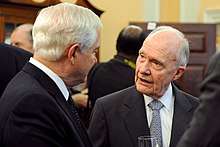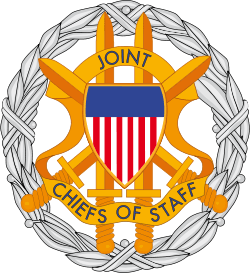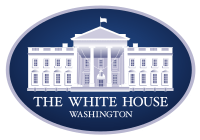Brent Scowcroft
Brent Scowcroft (/ˈskoʊkrɒft/; March 19, 1925 – August 6, 2020) was a United States Air Force officer who was a two-time United States National Security Advisor, first under U.S. President Gerald Ford and then under George H. W. Bush. He served as Military Assistant to President Richard Nixon and as Deputy Assistant to the President for National Security Affairs in the Nixon and Ford administrations. He served as Chairman of the President's Foreign Intelligence Advisory Board under President George W. Bush from 2001 to 2005, and advised President Barack Obama on choosing his national security team.
Brent Scowcroft | |
|---|---|
 Major General Brent Scowcroft in 1973 | |
| Chair of the President's Intelligence Advisory Board | |
| In office October 5, 2001 – February 25, 2005 | |
| President | George W. Bush |
| Preceded by | Warren Rudman |
| Succeeded by | Jim Langdon |
| 9th and 17th United States National Security Advisor | |
| In office January 20, 1989 – January 20, 1993 | |
| President | George H. W. Bush |
| Preceded by | Colin Powell |
| Succeeded by | Tony Lake |
| In office November 3, 1975 – January 20, 1977 | |
| President | Gerald Ford |
| Preceded by | Henry Kissinger |
| Succeeded by | Zbigniew Brzezinski |
| United States Deputy National Security Advisor | |
| In office January 4, 1973 – November 3, 1975 | |
| President | Richard Nixon Gerald Ford |
| Preceded by | Alexander Haig |
| Succeeded by | William G. Hyland |
| Personal details | |
| Born | March 19, 1925 Ogden, Utah, U.S. |
| Died | August 6, 2020 (aged 95) Falls Church, Virginia, U.S. |
| Political party | Republican |
| Spouse(s) | Marion Horner
( m. 1951; died 1995) |
| Education | United States Military Academy (BS) Columbia University (MA, PhD) |
| Military service | |
| Allegiance | |
| Branch/service | |
| Years of service | 1947–1975 |
| Rank | |
Early life and education

Scowcroft was born March 19, 1925, in Ogden, Utah, the son of Lucile (née Ballantyne) and James Scowcroft, a grocer and business owner.[1] He was a descendant of early 19th-century British immigrants from England and Scotland, along with immigrants from Denmark and Norway. He elaborated upon his relationship with The Church of Jesus Christ of Latter-day Saints in a 1999 oral history: "I have close personal ties to some of the church leadership. They would not consider me a good Mormon. I don’t live by all of the rules the Mormons like—I like a glass of wine and a cup of coffee. But yes, I do consider myself a Mormon. It’s part of a religious and a cultural heritage."[2]
Scowcroft received his undergraduate degree and commission in the United States Army Air Forces from the United States Military Academy at West Point, New York, in June 1947. With the establishment of an independent United States Air Force in September 1947, his commission transferred to the USAF. Scowcroft subsequently earned an M.A. (1953) and Ph.D. (1967) in international relations from Columbia University.[3]
Career



Having envisioned life as a fighter pilot following World War II, Scowcroft completed his pilot training in October 1948 following his commissioning as an Air Force Second Lieutenant in 1947 and received his Air Force Command Pilot Wings.[4] However, on January 6, 1949, while on flight training with North American P-51 Mustang, his P-51 Mustang aircraft experienced engine trouble after taking-off from Grenier Army Airfield, causing the plane to crash-land. Although his injuries were not critical and he was still able to continue his career as an Air Force Pilot, Scowcroft assumed that he would never fly again and considered another career within the Air Force.[4] He served in a variety of operational and administrative positions from 1948 to 1953. In the course of his military career, he held positions at the Joint Chiefs of Staff, headquarters of the United States Air Force, and the Office of the Assistant Secretary of Defense for International Security Affairs. His other assignments included: faculty positions at the United States Air Force Academy and the United States Military Academy, and Assistant Air Attaché in the American Embassy in Belgrade, Yugoslavia.[4]
As a senior officer, General Scowcroft was assigned to Headquarters U.S. Air Force in the office of the Deputy Chief of Staff, Plans and Operations, and served in the Long Range Planning Division, Directorate of Doctrine, Concepts and Objectives from 1964 to 1966. He next attended the National War College at Fort McNair, followed by assignment in July 1968 to the Office of the Assistant Secretary of Defense for International Security Affairs. In September 1969, he was reassigned to Headquarters U.S. Air Force in the Directorate of Plans as Deputy Assistant for National Security Council Matters. In March 1970 he joined the Joint Chiefs of Staff organization and became the Special Assistant to the Director of the Joint Staff.[5]




Scowcroft was appointed Military Assistant to the President in February 1972 and in January 1973 was reassigned as Deputy Assistant to the President for National Security Affairs.[6] He was promoted to lieutenant general on August 16, 1974 and retired from active duty at that rank on December 1, 1975. He had, just a month earlier, during the Halloween Massacre, become the United States National Security Advisor (for him, the first time), replacing Henry Kissinger.[7][8] Scowcroft's continued service in the Air Force would have been contingent on reconfirmation of his rank by the Senate, a distinction that National Security Advisor H. R. McMaster elected to pursue in 2018.[9]
His military decorations and awards included the Air Force Distinguished Service Medal, the Legion of Merit with oak leaf cluster and the Air Force Commendation Medal.[10]
Before joining the Bush administration, Scowcroft was vice chairman of Kissinger Associates. He had a long association with Henry Kissinger, having served as his assistant when Kissinger was the National Security Adviser under Richard Nixon, from 1969.[11]
Scowcroft chaired or served on a number of policy advisory councils, including the President's General Advisory Committee on Arms Control, the President's Commission on Strategic Forces, the President's Blue Ribbon Commission on Defense Management, the Defense Policy Board, and the President's Special Review Board (Tower Commission) investigating the Iran–Contra affair. He also served on the Guiding Coalition of the nonpartisan Project on National Security Reform. He was appointed Co-Chair of the Blue Ribbon Commission on America's Nuclear Future from 2010–2012 alongside Lee Hamilton.[12]
On the morning of September 11, 2001, Scowcroft was in an E-4B aircraft, also known as the National Airborne Operations Command Center (NAOC), on the tarmac waiting to takeoff and fly to Offutt Air Force Base, when the first hijacked airliner hit the World Trade Center (WTC). Scowcroft's aircraft was en route to Offutt when the second hijacked airliner struck the WTC and Scowcroft was involved in observing the command and control operations of both President George W. Bush in Florida and Vice President Dick Cheney, who was at the White House.[13]
Scowcroft was the founder and president of The Forum for International Policy, a think tank. He was also president of The Scowcroft Group, an international business consulting firm. He was co-chair, along with Joseph Nye, of the Aspen Strategy Group. He was a member of the Inter-American Dialogue, Trilateral Commission, and the Council on Foreign Relations and a board member of the Center for Strategic and International Studies and the Atlantic Council.[14]
Scowcroft was a leading Republican critic of American policy towards Iraq before and after the 2003 invasion, which war critics in particular have seen as significant given Scowcroft's close ties to former President George H. W. Bush.[15][16][17][18] He drew attention for reports of remarks critical of Bush – which he did not deny when reported by The Washington Post citing his view that "Bush is 'mesmerized' by Israeli Prime Minister Ariel Sharon, that Iraq is a 'failing venture' and that the administration's unilateralist approach has harmed relations between Europe and the United States." Despite his public criticism of the decision to invade, Scowcroft continued to describe himself as "a friend" of the Bush administration.[19] He also strongly opposed a precipitous withdrawal, arguing that a pull-out from Iraq before the country was able to govern, sustain, and defend itself "would be a strategic defeat for American interests, with potentially catastrophic consequences both in the region and beyond."[20] Scowcroft went on to stress that the U.S. must "secure the support of the countries of the region themselves. It is greatly in their self-interest to give that support.. unfortunately, in recent years they have come to see it as dangerous to identify with the United States, and so they have largely stood on the sidelines."
He backed the invasion of Afghanistan as a "direct response" to terrorism.[21]
President George H. W. Bush presented him with the Presidential Medal of Freedom in 1991. In 1993, he was created an Honorary Knight Commander of the Order of the British Empire by Queen Elizabeth II at Buckingham Palace. In 2005, Scowcroft was awarded the William Oliver Baker Award by the Intelligence and National Security Alliance.[22]
In 1998, he co-wrote A World Transformed with George H. W. Bush. This book described what it was like to be in the White House during the end of the Cold War, as the Soviet Union collapsed in the early 1990s. Notably, both figures explained why they didn't go on to Baghdad in 1991: "Had we gone the invasion route, the United States could conceivably still be an occupying power in a bitterly hostile land."[23]
His discussions of foreign policy with Zbigniew Brzezinski, led by journalist David Ignatius, were published in a 2008 book titled America and the World: Conversations on the Future of American Foreign Policy.[24]
Scowcroft was a member of the Honorary Council of Advisors for U.S.-Azerbaijan Chamber of Commerce (USACC).[25] Critics have suggested that Scowcroft was unethical in his lobbying for the Turkish and Azeri governments because of his ties to Lockheed Martin and other defense contractors that do significant business with Turkey.[26] He was also a member of the board of directors of the International Republican Institute,[27] and served on the Advisory Board for Columbia University's School of International and Public Affairs[28] and for America Abroad Media.[29]
Scowcroft endorsed Hillary Clinton in the run-up for the 2016 U.S. presidential election.[30]
Evaluation
Scholarly evaluations of Scowcroft's performance have been generally favorable. For example Ivo Daalder and I. M. Destler quoting other scholars, conclude:
"Brent Scowcroft was in many ways the ideal national security adviser—indeed, he offers a model for how the job should be done." His "winning formula" consisted of gaining the trust of the key principals of U.S. foreign policymaking, establishing "a cooperative policy process at all levels," one both transparent and collegial, and keeping an "unbreakable relationship with the president," thanks to their close friendship and mutual respect. The result was that Scowcroft "proved to be an extraordinarily effective national security adviser" in comparison with others who have held the office, particularly in light of the difficult and transformative period in which he held office.[31]
Scowcroft award
Scowcroft was the inspiration and namesake for a special presidential award begun under the George H. W. Bush administration. According to Robert Gates, the award is given to the official "who most ostentatiously falls asleep in a meeting with the president." According to Gates, the president "evaluated candidates on three criteria. First, duration—how long did they sleep? Second, the depth of the sleep. Snoring always got you extra points. And third, the quality of recovery. Did one just quietly open one's eyes and return to the meeting, or did you jolt awake and maybe spill something hot in the process?"[32] According to Bush himself, the award "gives extra points for he/she who totally craters, eyes tightly closed, in the midst of meetings, but in fairness a lot of credit is given for sleeping soundly while all about you are doing their thing."[33] Scowcroft had gained a reputation for doing such things to the extent that it became a running gag.[34]
Personal life
Scowcroft married Marian Horner in 1951. His wife, a Pennsylvania native, trained as a nurse at St. Francis School of Nursing in Pittsburgh and graduated from Columbia University. They had one daughter, Karen Scowcroft. Marian Horner Scowcroft, a diabetic, died on July 17, 1995, at George Washington University Hospital.[35] In March 1993, when Scowcroft was given an honorary KBE by Queen Elizabeth II, his daughter was also received by the Queen.[36]
Death
On August 6, 2020, Scowcroft died at his home in Falls Church, Virginia, at age 95.[37][38]
Honors



- Air Force Distinguished Service Medal with three bronze oak leaf cluster[40]




- Legion of Merit with oak leaf cluster[40]


.png)

_Ribbon.png)



Honorary degrees
| Location | Date | School | Degree |
|---|---|---|---|
| 1989 | George Washington University | Doctor of Laws (LL.D)[45] | |
| April 24, 1992 | Brigham Young University | Doctor of Public Service (DPS)[46] | |
| 2000 | College of William & Mary | Doctor of Humane Letters (DHL)[47] | |
| May 18, 2005 | Columbia University | Doctor of Laws (LL.D)[48] | |
| December 10, 2010 | Weber State University | Doctor of Humane Letters (DHL)[49] | |
See also

- History of the United States National Security Council 1989–1992
References
- "Brent Scowcroft". Center for Strategic and International Studies. 2012. Retrieved June 9, 2012.
- "Brent Scowcroft Oral History". Miller Center of Public Affairs. Retrieved August 8, 2020.
- "Brent Scowcroft". Aspen Institute. Retrieved August 8, 2020.
- McFadden, Robert D. (August 6, 2020). "Brent Scowcroft, a Force on Foreign Policy for 40 Years, Dies at 95". nytimes. Retrieved August 7, 2020.
- https://www.af.mil/About-Us/Biographies/Display/Article/104997/lieutenant-general-brent-scowcroft/
- Charlton, Linda (November 4, 1975). "Deputy in Kissinger's Place". The New York Times. ISSN 0362-4331. Retrieved April 25, 2020.
- Gelb, Leslie H. (November 4, 1975). "Ford's Timetable Upset in Shakeup". The New York Times. ISSN 0362-4331. Retrieved April 25, 2020.
- https://thehill.com/policy/defense/322718-senate-panel-approves-trump-adviser-keeping-his-military-rank
- https://thehill.com/policy/defense/322718-senate-panel-approves-trump-adviser-keeping-his-military-rank
- "Biographies : Lieutenant General Brent Scowcroft". Af.mil. Archived from the original on October 21, 2012. Retrieved November 26, 2012.
- "Kissinger Becomes Secretary of State". U.S. Department of State. Retrieved August 8, 2020.
- https://www.hsdl.org/?abstract&did=733576
- Brzezinski, Zbigniew; Scowcroft, Brent (2008). America and The World: Conversations on the future of American Foreign Policy. Basic Books. ISBN 978-0-465-01501-6.
- Archived August 6, 2007, at the Wayback Machine
- "Double Warning Against Iraq War". Commondreams.org. August 5, 2002. Archived from the original on September 21, 2012. Retrieved November 26, 2012.
- "Interviews – Brent Scowcroft | Gunning For Saddam | FRONTLINE". PBS. November 20, 2012. Retrieved November 26, 2012.
- Kessler, Glenn (October 16, 2004). "Scowcroft Is Critical of Bush". The Washington Post. Retrieved April 26, 2010.
- Priest, Dana; Wright, Robin (January 7, 2005). "Scowcroft Skeptical Vote Will Stabilize Iraq". The Washington Post. Retrieved April 26, 2010.
- Rice, Andrew (September 6, 2004). "Brent Scowcroft Calls Iraq War "overreaction"". The New York Observer. Retrieved June 20, 2014.
- Scowcroft, Brent (January 4, 2007). "Getting the Middle East Back on Our Side". The New York Times. Retrieved June 20, 2014.
- Goldberg, Jeffrey (October 24, 2005). "Breaking Ranks". The New Yorker. Retrieved August 7, 2020.
- https://www.insaonline.org/events/baker/recipients/
- vanden Heuvel, Katrina (October 19, 2004). "Scowcroft Blasts W." The Nation. Retrieved August 7, 2020.
- https://www.nytimes.com/2008/09/23/books/23kaku.html
- "USACC. Brent Scowcroft". Archived from the original on April 11, 2009. Retrieved April 22, 2010.
- "Kissinger, Iraq, BNL". Pinknoiz.com. Retrieved November 26, 2012.
- International Republican Institute web site, accessed July 16, 2010 Archived April 28, 2010, at the Wayback Machine
- "SIPA: School of International and Public Affairs". Sipa.columbia.edu. Archived from the original on December 21, 2012. Retrieved November 26, 2012.
- "Archived copy". Archived from the original on July 16, 2014. Retrieved June 16, 2014.CS1 maint: archived copy as title (link)
- Blake, A. 78 Republican politicians, donors and officials who are supporting Hillary Clinton.. The Washington Post. December 7, 2016.
- Ivo Daalder and I. M. Destler, In the Shadow of the Oval Office: Profiles of the National Security Advisers and the Presidents They Served—From JFK to George W. Bush (2009), p. 170.
- Wilkie, Christina (May 12, 2010). "Fall asleep in the Oval Office? You could win a 'Scowcroft award'". The Hill. Retrieved September 12, 2013.
- "The Boss Lauds a Champion Sleeper". The New York Times. January 18, 1990. Retrieved September 12, 2013.
- Roberts, Argetsinger, Roxanne, Amy (December 14, 2011). "Brent Scowcroft and the art of sleeping through the meeting". The Washington Post. Retrieved September 12, 2013.
- "Marian Horner Scowcroft – St. Francis Hospital (Pittsburgh) School of Nursing Memorial Site". Lindapages.com. July 18, 1995. Archived from the original on September 10, 2012. Retrieved November 26, 2012.
- "Court Circular – People – News". The Independent. March 18, 1993. Retrieved November 26, 2012.
- "Longtime presidential adviser Brent Scowcroft dies at 95". NBC News. Associated Press. August 7, 2020. Retrieved August 7, 2020.
- McFadden, Robert D. (August 7, 2020). "Brent Scowcroft, a Force on Foreign Policy for 40 Years, Dies at 95". The New York Times. ISSN 0362-4331. Retrieved August 7, 2020.
- Sparrow, Bartholomew (January 27, 2015). The Strategist: Brent Scowcroft and the Call of National Security. PublicAffairs. ISBN 978-1586489632.
- "Longtime Public Servant Brent Scowcroft Dies". Texas A&M Today. August 7, 2020. Retrieved August 7, 2020.
- Brent Scowcroft | The Scowcroft Group, biography
- Remarks Honoring Brent Scowcroft with the DOD Distinguished Public Service Award
- "Vabariigi President". www.president.ee. Retrieved December 4, 2018.
- "General Scowcroft awarded Grand Cordon of the Order of the Rising Sun – The Scowcroft Group". www.scowcroft.com. Retrieved December 4, 2018.
- "Honorary Degree Recipients – GW Libraries". library.gwu.edu. Retrieved December 4, 2018.
- "SCOWCROFT SAYS NOW IS TIME TO HELP SHAPE WORLD
". April 24, 1992. Retrieved December 4, 2018. - "Lieutenant General Brent Scowcroft". Bush School of Government and Public Service. Texas A&M University. Retrieved August 7, 2020.
- "Complete List of Recipients (1945–Present) – Office of the Secretary of the University". secretary.columbia.edu. Retrieved December 4, 2018.
- "Former National Security Advisor to Receive Honorary Degree". www.weber.edu. Retrieved December 4, 2018.
Further reading
- Daalder, Ivo H., and I. M. Destler. In the Shadow of the Oval Office: Profiles of the National Security Advisers and the Presidents They Served—From JFK to George W. Bush. Simon & Schuster; 2009, ISBN 978-1-4165-5319-9.
- Sparrow, Bartholomew H. "Realism's Practitioner: Brent Scowcroft and the Making of the New World Order, 1989–1993". Diplomatic History 34.1 (2010): 141–175. JSTOR 24916037.
- Sparrow, Bartholomew. The Strategist: Brent Scowcroft and the Call of National Security (2015).
Primary sources
- Bush, George H.W., and Brent Scowcroft. A world transformed (Vintage, 2011). excerpt
- Deutch, John, Arnold Kanter, and Brent Scowcroft. "Saving NATO's foundation." Foreign Affairs (1999) 78#6: 54–67. online
- Perry, William James, Brent Scowcroft, and Charles D. Ferguson. US nuclear weapons policy (Council on Foreign Relations, 2009) online.
- Scowcroft, Brent. "Getting the Middle East Back on Our Side." New York Times (January 4, 2007) online.
External links
| Wikimedia Commons has media related to Brent Scowcroft. |
| Wikisource has original works written by or about: Brent Scowcroft |
- Oral History of Brent Scowcroft at The West Point Center for Oral History (www.westpointcoh.org) at Archive.today (archived April 16, 2013)
- Appearances on C-SPAN
- Brent Scowcroft on IMDb
- Brent Scowcroft on Charlie Rose
- Brent Scowcroft biographic sketch at The Scowcroft Group
- "Brent Scowcroft collected news and commentary". The New York Times.
| Political offices | ||
|---|---|---|
| Preceded by Alexander Haig |
Deputy National Security Advisor 1973–1975 |
Succeeded by William Hyland |
| Preceded by Henry Kissinger |
National Security Advisor 1975–1977 |
Succeeded by Zbigniew Brzezinski |
| Preceded by Colin Powell |
National Security Advisor 1989–1993 |
Succeeded by Tony Lake |
| Government offices | ||
| Preceded by Warren Rudman |
Chair of the President's Intelligence Advisory Board 2005–2009 |
Succeeded by Jim Langdon |
| Chair of the Intelligence Oversight Board 2005–2009 | ||

.jpg)